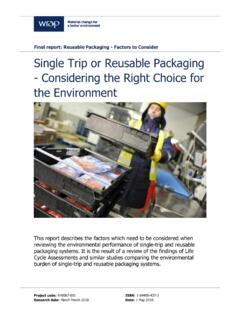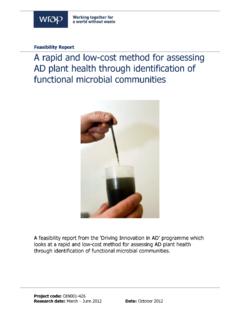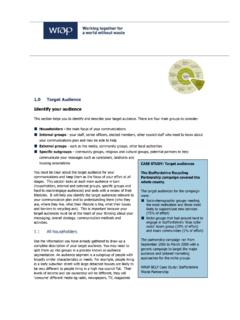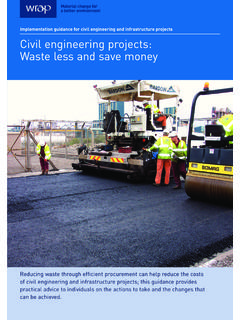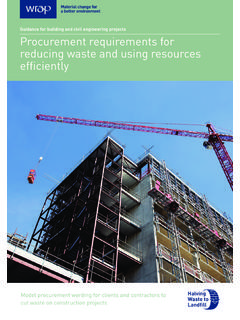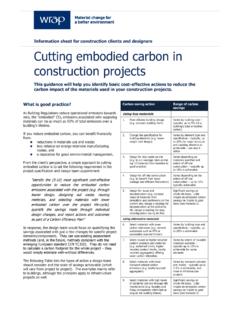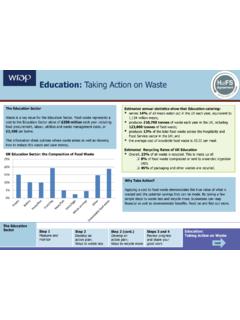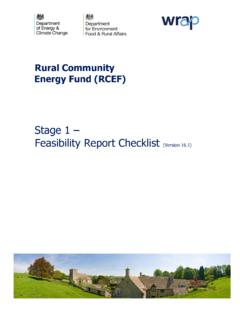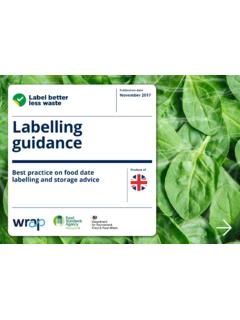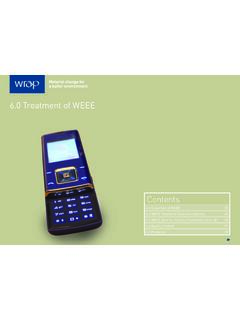Transcription of Using recycled polymers in new products: a …
1 Using recycled polymers in new products: a business opportunity polymer use in the UK In 2012 the global production of plastics was 2881 million tonnes an increase of on 2011. The European Union (EU 27+2) represents of the global plastics production in 2012, with the UK producing million tonnes. The UK processes more than four million tonnes of plastics per annum. Approximately 40 per cent of plastics are used for single-use disposable applications, such as packaging, agricultural films and disposable consumer items, between 20 and 25% for long-term infrastructure such as pipes, cable coatings and structural materials such as windows and 6% for automotive use. 1 BPF correspondence Figure 1: Plastic recycling plant In 2011, around 550,000 tonnes of plastic bottles, around 550,000 tonnes of non-bottle rigid plastic packaging (pots, tubs and trays) and around 550,000 tonnes of film entered the UK household waste and recycling system2.
2 Whilst around 96% of Local Authorities provide a kerbside collection of bottles, almost half of bottles are still not recycled , costing local councils millions in disposal costs. 2 Plastic Composition 2011 Report- WRAP & Valpak 2013: Figure 2: Bottles suitable for recycling. recycled polymer availability The UK generated over 500,000 tonnes of recycled polymers in UK which could be used in place of virgin materials with a potential reduction in cost and carbon footprint. The majority of this material is polyethylene (PE), polypropylene (PP) and polyethylene terephthalate (PET) which can be fed straight back into packaging products and numerous other applications. Using recycled polymers in new products: a business opportunity WRAP has identified a number of business opportunities for increasing the use of recycled polymers in the UK.
3 This document presents the business case for recycled plastics and is designed to highlight commercial opportunities in the UK. Target audience This business case is aimed at senior managers at moulders, manufacturers brand owners and retailers who are looking to reduce the cost and carbon footprint of their products. It may also be of interest to product and environmental managers of both domestic and commercial products and packaging. The benefits of recycled polymers The cost of virgin polymers is dependent upon the cost of crude oil and can vary significantly across the year. recycled polymer prices may not suffer from this fluctuation, as they are not directly connected to this price. This could lead to a significant saving per annum. There is also a growing demand for products with recycled content which creates a commercial advantage to products with a recycling story attached to it.
4 There is a significant reduction in carbon impact for products and packaging with recycled plastics: Using a tonne of recycled plastic bottles (rPET or rHDPE ) in new bottles saves around a tonne of CO2eq. (revised 2014) Case studies High Density Polyethylene (HDPE) Milk bottles HDPE is a type of resin commonly used in plastics bottles. It is widely used in the UK for fresh milk bottles, shampoo and detergent bottles. Figure 3. HDPE milk bottles Of the 316,000 tonnes of plastic bottles captured for recycling through local authority collections in 2012, HDPE bottles made up almost 50% of the stream. In the UK, in 2012, 77% of HDPE milk bottles were recycled3. A series of pioneering research and development projects led by WRAP, with industry partners developed the worlds first process to recycle HDPE milk bottles back into food grade recycled HDPE (rHDPE) for use in new milk bottles4.
5 3 UK Household Plastics Collection Survey 2013 Recoup 4 Using recycled polymers in new products: a business opportunity Reprocessing facilities have been set up in the UK to produce food grade recycled HDPE and this has enabled the UK dairy industry to close the loop by manufacturing new milk bottles with recycled content - delivering environmental benefits through a reduction in landfill and carbon savings. The Dairy Roadmap (formerly known as the Milk Roadmap) has set targets for the use of rHDPE in new milk bottles of 10% by 2010 (achieved), 30% by 2015 (on target) and 50% by 2020. Over 2 billion milk bottles sold per year on the UK market contain recycled HDPE. Increasing the recycled content in plastic milk bottle packaging uses this resource more efficiently and realises environmental benefits by reducing the use of virgin plastic, saving energy and reducing greenhouse gas emissions.
6 PP Paint tubs A new plastic paint pail developed by RPC Containers Oakham for manufacturer Newlife Paints incorporates 25% recycled content. The design was developed by RPC Oakham with UK suppliers of recycled plastics to ensure a high-grade polymer capable of withstanding the weight of paint. This new pot reinforces the environmental credentials of a new range of largely reclaimed paints being stocked by retail DIY chain B&Q. RPC Oakham tests showed that the optimum proportion of recycled polymer for the 5-litre injection moulded PP pail was 25%, in order to maintain the highest standard of consumer functionality and convenience. PET bottles Following trials in 2007 of recycled PET5, a number of key brands and retailers are now Using rPET across a number of product lines.
7 Marks & Spencer is Using it across its Food to Go range and other produce categories, while Boots has committed to the long-term use of rPET. Figure 5: Variety of PET bottles Over a six month period Coca Cola produced 75 million bottles made with 25% rPET with successful results. The trial also showed that Using rPET reduces the amount of energy needed for bottle manufacture compared to virgin resin, offering a small saving in electricity costs. At the time the company was producing bottles in 17 markets around the world with up to 25% recycled PET content. 5 Figure 4: Paint Pot Containing recycled PP Using recycled polymers in new products: a business opportunity recycled HIPS and PCABS in electrical and electronic equipment Home Entertainment WRAP conducted a number of studies to demonstrate that Using recycled WEEE-derived plastics in high-performance electrical products could be a viable technical and economic option.
8 One project investigated premium audio equipment products for home entertainment. Bowers & Wilkins and Meridian6, both global electronics companies, agreed to trial recycled plastics in some of their products, in place of the virgin plastics used at present for the components. Two products were chosen for the trial: 800 series hi-fi loudspeakers by Bowers & Wilkins (B and F80 hi-fi by Meridian, co-branded with Ferrari. The speaker grills are relatively large components (1080 x 220mm). While both of the products parts are complex, the Meridian hi-fi components had more demanding physical moulding requirements. Very few concessions were made in the moulding techniques for the trials. The recycled High Impact Polystyrene (HIPS) plastic was subjected to exactly the same moulding conditions as those for the virgin plastics.)
9 Some minor changes in moulding procedures were introduced for the PCABS plastic, due to slight differences in the material. Overall, the study established that recycled plastics can perform to the standards required in premium audio products, and in some components better than virgin materials. Results included: A cost saving of 13% per tonne could be achieved Using recycled HIPS in the Bowers & Wilkins loudspeaker grills; A saving of 72% CO2eq per tonne could be achieved Using recycled HIPS in place of virgin material; A saving of 50% CO2eq could be achieved in producing the Bowers & Wilkins speaker grills with recycled HIPS; and A reduction in blowing agent was possible in the speaker mouldings Using recycled HIPS. Washing Machines A second project saw how Indesit Company worked with its subcontract plastic moulding company (RGE) to produce an access panel that will fit onto the back of a washing machine.
10 The access panel is made by Using recovered fridge waste, which is then shredded and made into a high grade polymer pellet. The access panel plate has been manufactured Using 100 per cent recycled plastic with similar characteristics to the previous part that was made from virgin material. The pilot project was considered such a success that the plate is now being integrated into the back of the premium Hotpoint Aquarius and Ultima Washing Machines. Figure 6. B&W speaker grills 6 Using recycled polymers in new products: a business opportunity Indesit Company has also adapted the production process to allow them to easily alternate between Using virgin and recycled materials, providing extra flexibility. Indesit Company expects that replacing virgin plastic with recycled plastic will result in significant CO2 equivalent saving and at least a 5% saving in material costs for every tonne of recycled plastic used7.
